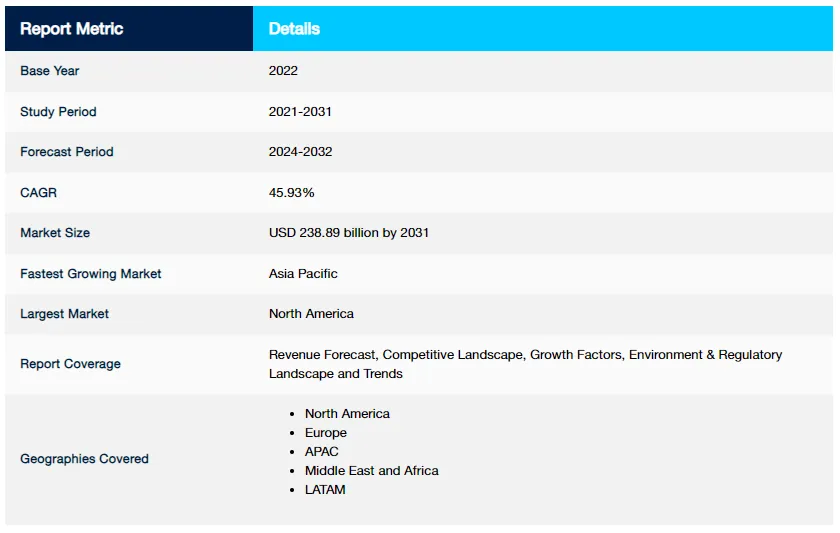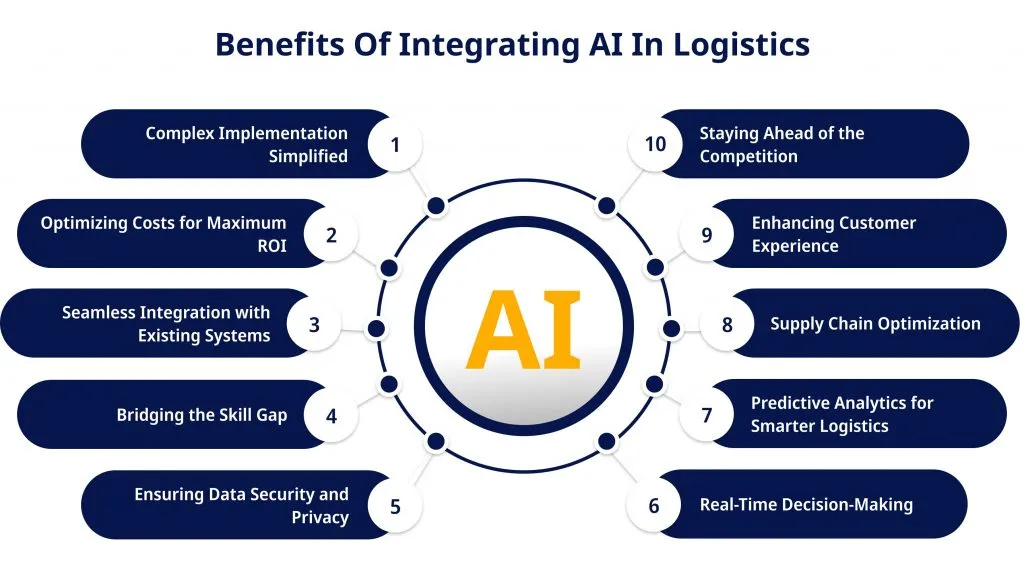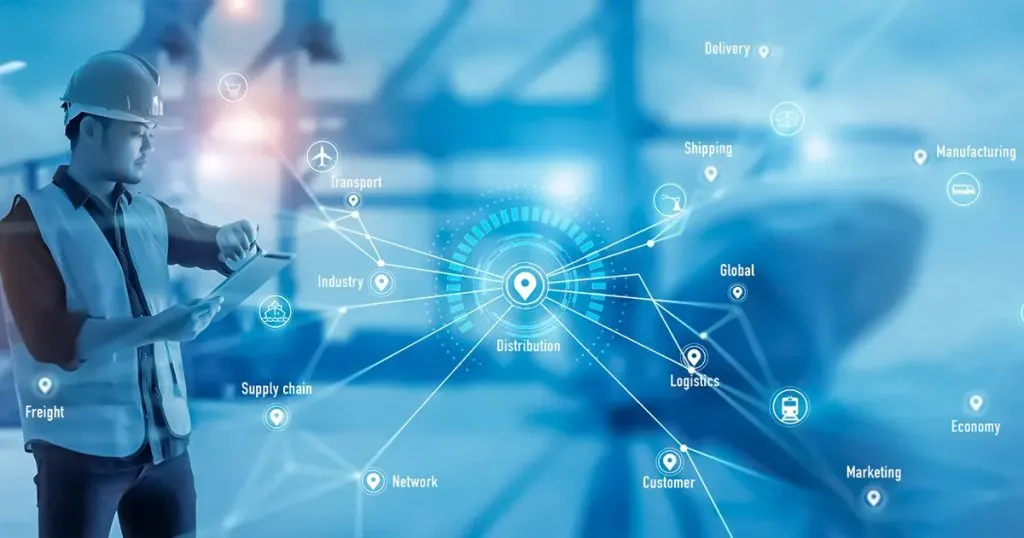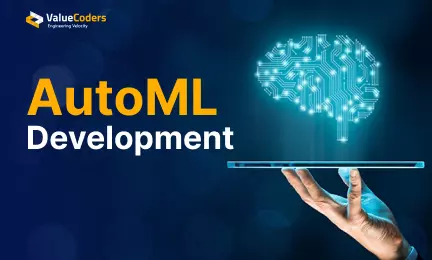Did you know that AI in logistics is projected to grow by over 45.93%, reaching 238.89 billion by 2031?
With such immense potential, it’s no surprise that AI is revolutionizing the logistics industry.
But what exactly is the role of AI in logistics? How can this emerging technology enable supply chain optimization, predictive analytics, and efficiency improvements?
This blog will try to answer these critical questions and more. We’ll highlight real-world case studies of leading companies leveraging AI to enhance delivery times, reduce costs, and delight customers.
You’ll learn the tangible benefits attainable across warehousing, last-mile delivery, route optimization, and beyond. So, if you want to explore how to harness AI’s power to transform your logistics operations, continue reading this blog post!
Our in-depth guide will leave you inspired, informed, and equipped to implement AI-driven solutions.
Our bespoke AI roadmaps equip logistics firms with optimized, agile, self-driving supply chains.
Let’s discuss the benefits of integrating AI in logistics in detail with real-world examples and use cases.
1. Complex Implementation Simplified
Integrating AI in logistics can seem challenging initially. However, with an experienced technology partner, streamlined implementation is achievable.
Difficulties like system compatibility issues, data complexity, and lack of in-house AI expertise can be addressed systematically.
The key is taking an iterative approach – starting with a defined pilot project before scaling across the organization.
For instance, by deploying an AI-based vehicle routing optimization module, Global Logistics Group simplified integration. This focused solution delivered quick wins, like annual freight savings.
Encouraged by rapid ROI, Global then expanded AI adoption via ValueCoders’ logistics & transportation software development services assistance.
Additionally, having logistics experts involved during requirements planning and user testing is vital for simplifying adoption. When end-users provide input and validation, it ensures the AI solution enhances existing processes rather than disrupting workflows.
While integrating AI in the logistics industry necessitates upfront effort, it quickly starts paying dividends. A practical strategy combined with the right technology partner facilitates streamlined adoption, as the Global Logistics Group success proves, allowing logistics companies to realize immense AI’s potential.
2. Optimizing Costs for Maximum ROI
Adopting AI in logistics necessitates strategic budgeting to maximize ROI. The good news? Multiple cost-effective strategies exist for supply chain leaders.
Firstly, take an incremental approach focused on high-impact use cases like shipment route optimization. Quick wins in a single domain allow reallocating funds to scale AI across other applications.
Additionally, using agile software development practices ensures cost efficiency. For instance, a machine learning development company like ValueCoders team leverages agility to validate solution viability before full-scale production.
This fail-fast methodology prevents wasted expenditure on complex AI systems from fulfilling business needs.
Real-world examples prove prudent AI investments offer unmatched ROI. One consumer goods major saved millions after with an intelligent warehouse management algorithm.
The algorithm optimized staff allocation, inventory, and shipment consolidation by allowing dynamic planning and predictive demand modeling.
Therefore, while holistic AI adoption requires an upfront budget, a phased approach targeted at maximum business impact delivers exponential savings over time. Partnering with an expert AI development company is key to an optimized, cost-effective rollout.
Activate cost and time savings with our AI-powered automation tailored for logistics leaders.
3. Seamless Integration with Existing Systems
Integrating AI in logistics can raise valid concerns about compatibility with entrenched legacy systems. However, with careful planning, seamless integration is achievable.
The key is taking a phased approach focused first on augmenting specific workflows via AI rather than completely transforming them overnight.
For example, deploying chatbots handles customer inquiries faster without disrupting existing CRM platforms.
Likewise, adding AI-based data analytics to existing ERP or TMS systems boosts their optimization capability exponentially. Rather than replacing entire systems, targeted AI integration maximizes the impact on supply chain performance.
Domain experts also stress the importance of UX design in enabling frictionless adoption across the organization. Well-designed user interfaces allow employees to leverage AI functionalities while maintaining familiar workflows.
Ultimately, logistics firms can agree on AI with existing tech stacks by adopting APIs and interoperability standards. Partners like ValueCoders provide end-to-end support spanning design, integration, testing, and maintenance – ensuring your AI solutions sync seamlessly with current systems.
Also read: Maximize Industry Success with CRM
4. Bridging the Skill Gap
Upskilling workforces is crucial as AI transforms business models. For logistics firms, integrating solutions like predictive analytics and intelligent process automation necessitates training staff on leveraging AI’s expanding role.
Hands-on workshops allow employees to familiarize themselves with AI functionalities relevant to their workflows. Likewise, online training modules accessible 24/7 provide scalable reskilling options.
Leading companies also cultivate the internal role of artificial intelligence in logistics expertise by sponsoring emerging tech conferences and hackathons.
Sponsoring participation in external hackathons even allows for scouting technical talent for future recruitment.
Additionally, having on-demand troubleshooting support during initial adoption phases prevents employee frustration with artificial intelligence in logistics.
Logistics partners like ValueCoders provide post-deployment assistance via remote help desks and on-site consultants.
Proactive reskilling maximizes user adoption of AI systems while minimizing business disruption. It also empowers staff to focus on higher-value tasks made possible by automated operations.
5. Ensuring Data Security and Privacy
As logistics operations grow increasingly data-driven, securing sensitive information is paramount, especially when integrating innovative AI and machine learning solutions.
Companies avoid reputational damage and legal liabilities by safeguarding supplier contracts, customer info, trade secrets, and other privileged data.
Rigorous access controls, advanced encryption, and data anonymization provide a robust defense for AI in logistics.
Fostering an ethical data culture across teams working with AI systems is equally crucial. Providing mandatory training in data privacy principles prevents potential misuse at the human level.
On the technology side, developing explainable AI models with complete audit trails safeguards against unfair bias or decisions. Machine learning algorithms such as federated learning also allow collaborative learning without exposing raw data.
While the regulatory environment continues evolving, proactive self-governance remains vital. By investing in data security and pioneering privacy-enhancing techniques, logistics leaders can extract maximum value from data while engendering stakeholder trust – crucial for success in the dawning AI-powered era.
Also read: Machine Learning Integration: Best Practices
6. Real-Time Decision-Making
The logistics sector must respond rapidly to volatile market dynamics. By analyzing real-time data insights, AI empowers agile decisions even amidst disruption.
For example, automated warehouses can dynamically recalibrate inventories, storage slots, staffing, and shipment schedules to accommodate rush orders or delays.
Rather than relying on lagging indicators, real-time visibility facilitated by IoT sensors and predictive analytics informs proactive planning for AI in logistics.
Leading 3PL provider DDC Logistics averted millions in pandemic losses using AI to reroute global shipments based on up-to-date port congestion metrics. This skill is crucial as supply chain instability becomes the norm.
By leveraging cloud-based AI models, logistics leaders can detect anomalies, mobilize responses, and optimize operations at machine speed.
With ValueCoders, you hire machine learning engineers in India who fine-tune algorithms continuously to meet changing industry demands. Connect with our advisors to future-proof your firm with real-time decision intelligence.
Our conversational AI and real-time tracking improve logistics customer experience exponentially.
7. Predictive Analytics for Smarter Logistics
Predictive analytics unlocks a strategic edge for supply chain leaders vying for dominance. By analyzing historical patterns augmented by external datasets, AI empowers accurate demand forecasting, dynamic inventory optimization, and transportation planning.
For example, algorithmic analysis of past sales, climate data, geo-political shifts, and more enabled Ocean Global Logistics to forecast regional container demand six months ahead.
Accordingly, AI in logistics repositioned fleets worldwide, securing capacity despite volatile conditions. This foresight is now crucial as industry volatility intensifies.
Likewise, machine learning uncovers sales seasonality, trends, and correlations at a granular level. Integrating with planning modules via AI-driven automation gives procurement and warehouse heads an extended horizon to sharpen strategies.
The future of AI in logistics leans towards companies that specialize in predictive business process automation, aiming to enhance operational efficiency.
The data science experts can empower your organization with strategic clairvoyance unmatched in the industry!
Also read: Top Data Engineering Companies to Watch
8. Supply Chain Optimization
Integrating AI across supply chain architecture enables optimized, lean operations. Machine learning-based analytics and prediction models empower data-driven planning while intelligent automation handles execution.
For example, AI in logistics can dynamically adjust warehousing staffing needs by predicting order volumes, thereby lowering labor costs.
Likewise, algorithms can optimize shipment routing and scheduling for on-time delivery at minimal logistics spend.
Global shipping giant OceanX achieved 12% efficiency gains after deploying AI across procurement, inventory, and transport management.
By leveraging reinforcement learning, neural networks, and simulation modeling, OceanX optimized end-to-end flows.
Additionally, machine vision and sensor data analytics are transforming warehouse management.
AI pioneer Logivision reduced storage density and picking errors for a leading 3PL firm by digitally orchestrating slotting, layouts, and autonomous bot swarms.
If you seek affordable services, hire artificial intelligence developers who offer integrated supply chain management solutions that harness the latest advances in cloud robotics, predictive analytics, and industrial IoT.
Our AI consultants equip you with data-driven logistics innovation for sustained growth.
9. Enhancing Customer Experience
Delighting customers is imperative for logistics companies to retain accounts in an increasingly competitive industry. AI-powered technologies like predictive analytics and natural language chatbots empower responsive, personalized customer experiences.
For example, logistics leader DDC introduced a virtual assistant that leverages sentiment analysis and speech recognition to address delivery-related inquiries. This 24/7 automated support reduced call volumes while boosting customer satisfaction scores.
Additionally, real-time tracking and AI-optimized routing provide proactive communication of delays or exceptions well in advance. This transparency results in greater trust.
Albertsons, a leading US grocer, achieved an increase in loyalty program renewals after partnering with FourKites to send personalized alerts on order status via preferred channels.
In essence, AI is revolutionizing logistics CX. Let us help you lead change in your organization. With extensive analytics and conversational AI expertise, ValueCoders delivers transformative solutions that delight customers.
10. Staying Ahead of the Competition
Logistics is rapidly becoming an algorithmic arms race. Leaders increasingly leverage AI and analytics for competitive differentiation through predictive insights, hyperautomation, or cutting-edge customer experiences.
The message is clear: quickly assimilate AI in logistics across operations or risk extinction. Our global team of 500+ AI specialists rapidly empowers logistics firms with customized solutions in conversational AI, computer vision, predictive maintenance, demand forecasting, and more.
We help you win more RFPs by demonstrating quantifiable efficiency and visibility gains enabled by AI adoption since competitors struggle with piecemeal automation and dated tech stacks.
Whether through overall supply chain cost reductions, technology-led ancillary revenue streams, or imaginative CX, we consistently enable you to stay ahead through AI-powered transformation.
The future of logistics favors strategic movers. Contact us to discuss an AI roadmap tailored to your growth goals.
Our actionable insights equip you to lead disruption in the industry – externally with clients and internally amongst employees – setting up your organization for enduring market dominance!
Our pioneering AI solutions consistently help logistics leaders outpace rivals.
In Closing
Transforming logistics with AI is no longer an option but an imperative for supply chain leaders pursuing dominance. As this blog highlighted, the impact of artificial intelligence on the logistics industry integrating predictive analytics, automation, and other innovations across planning, execution, and customer experience unlocks immense value.
Key Takeaways:
- AI optimizes costs, assets, agility, and workflows exponentially
- Strategic adoption enables gaining competitive advantage
- Choosing the right technology partner ensures ROI and innovation
The path forward is clear – extend your AI capabilities now or risk disruptions. ValueCoders, with expertise in 500+ AI solutions, is the ideal partner for your modernization needs. When you hire AI engineers from us, they help future-proof supply chain operations with tomorrow’s technologies today!
Contact us to get started on an AI roadmap tailored to your organization’s strategic objectives.


















